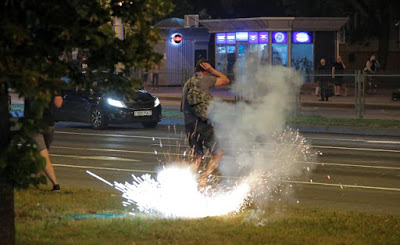Belarusian police clash with opposition protesters who accuse strongman leader Alexander Lukashenko, in power since 1994, of rigging his re-election victory. The ongoing 2020 Belarusian protests, nicknamed the Slipper Revolution and the Anti-Cockroach Revolution, are a series of street protests against Belarus's authoritarian regime of Alexander Lukashenko. The demonstrations, part of the Belarusian democracy movement, started occurring in the lead-up to and during the 2020 Belarusian presidential election, in which Lukashenko sought a sixth term in office. protesters lead to massive spread of COVID-19 in the country which forced the country into lockdown.
Alexander Lukashenko has been called Europe's "last dictator". At the outset of the protests, he had been in power for 26 years, making him the longest-tenured head of state in the former Soviet Union, having led the country since 1994. Under his authoritarian rule, the government has frequently oppressed the opposition. Lukashenko had faced greater public opposition amid his handling of the coronavirus pandemic, which Lukashenko has denied is a serious threat. Of the five elections won by Lukashenko, only the first was credibly deemed free and fair by international monitors. During the presidential campaign, presidential candidate Tsikhanouskaya has stated that the people of Belarus have to find a way to protect their vote. Therefore, all of the protests against Lukashenko were "leaderless".
On 29 July, supported by the Belarussian government news, 33 alleged mercenaries from the Wagner Group, a Russian private military company, were recently arrested in a sanatorium near Minsk. On 30 July, a permitted rally of presidential candidate Svetlana Tikhanovskaya took place in the Friendship of Peoples Park in Minsk. According to human rights activists, 63,000–70,000 people gathered, and the police recollected only about 18,250 people there. It was one of the biggest meetings since 1991. On 6 August, an estimated 5,000 peaceful protesters took to the streets in Minsk, waving white ribbons, calling for free and fair elections. Over the first week in August, tens of thousands of Belarusians demonstrated against Lukashenko in towns and cities across Belarus. 63,000 people demonstrated in the capital Minsk, which is the most massive street protests in post-Soviet Belarus.
On 9–11 August, several independent journalists were arrested in Minsk, Brest, and Babruysk. According to a statement by the Belarusian Association of Journalists, on 10 August, internal troops and other government forces deliberately shot rubber bullets at independent journalists in Minsk (including Tut.by and Nasha Niva), who wore special high visibility jackets and had personal IDs. Nasha Niva editor-in-chief (also wearing a jacket) disappeared during the night, but he managed to send an SOS-SMS to his wife, saying he was arrested. His fate was unknown as of 13:30 local time, and the Nasha Niva website wasn't updated for many hours after his presumed arrest. Several journalists, including foreigners, were slightly injured during the suppression of the protests. A rubber bullet hit the plastic ID of Getty Images' photojournalist Michal Fridman. Several Russian journalists from both official media and Internet projects were arrested but was soon released. On 11 August, it was reported that police officers and other government agents forcibly took away memory cards from devices of many journalists, forced them to delete photos or sometimes crushed their cameras. BBC News Russia reported that three of its journalists were beaten by the government forces that night while covering the protests.














0 Comments